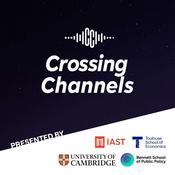In this final episode of season 4, Richard Westcott is joined by Catherine Barnard (University of Cambridge) and Emmanuelle Auriol (Toulouse School of Economics) to explore the economic, legal, and social dimensions of migration.
Drawing on insights from law and economics, the conversation explores how migration affects labour markets, legal protections, and social cohesion — from post-Brexit realities in Great Yarmouth, UK, to global questions of fairness and opportunity. The episode examines who migrates and why, the limits of current border regimes, and what more effective and ethical migration policies could look like.
Season 4 Episode 10 transcript: https://www.bennettschool.cam.ac.uk/wp-content/uploads/2025/08/S04E10-Final-transcript.pdf
Listen to this episode on your preferred podcast platform: https://pod.fo/e/309b75
For more information about the Crossing Channels podcast series and the work of the Bennett School of Public Policy and the Institute for Advanced Study in Toulouse, visit our websites at https://www.bennettschool.cam.ac.uk/ and https://www.iast.fr/.
Follow us on Linkedin, Bluesky and X.
With thanks to:
Audio production by Steve Hankey
Associate production by Burcu Sevde Selvi
Visuals by Tiffany Naylor and Aurore Carbonnel
More information about our host and guests:
Richard Westcott is an award-winning journalist who spent 27 years at the BBC as a correspondent/producer/presenter covering global stories for the flagship Six and Ten o’clock TV news as well as the Today programme. In 2024, Richard left the corporation and he is now the communications director for Cambridge University Health Partners and the Cambridge Biomedical Campus, both organisations that are working to support life sciences and healthcare across the city. @BBCwestcott
Emmanuelle Auriol is a French economist and professor at Toulouse School of Economics. Her research combines theory and empirics in industrial organisation and development economics, focusing on market failures driven by rent-seeking, cognitive biases, and discriminatory norms. Her work blends neoclassical and behavioural economics and has been published in top journals. A CNRS Bronze Medalist and member of the Institut Universitaire de France, she is also a fellow of the EEA, CEPR, CESifo, and EUDN. She contributes to policy and development work with institutions like the French Development Agency and the World Bank. She serves on the Conseil d'Analyse Économique, is a member of the Cercle des Économistes, and has authored two award-winning books.
Catherine Barnard FBA, FLSW, FRSA is Professor of European Law at the University of Cambridge. She is the author of EU Employment Law (Oxford, OUP, 2012, 5th ed.), The Substantive Law of the EU: The Four Freedoms, (Oxford, OUP, 2025, 8th ed), and (with Peers ed), European Union Law (Oxford, OUP, 2023, 4th ed). She is a member of the European Commission funded European Labour Law Network (ELLN). She is a Senior Fellow of the UK in a Changing Europe where she considers the legal issues around migration, together with the legal and constitutional issues associated with Brexit, in particular the Withdrawal Agreement and the Trade and Cooperation Agreement. She has appeared on the main media channels - BBC, ITV and Sky - as well as some of the more specialist programmes such as Law in Action, Woman's Hour, Question Ti



